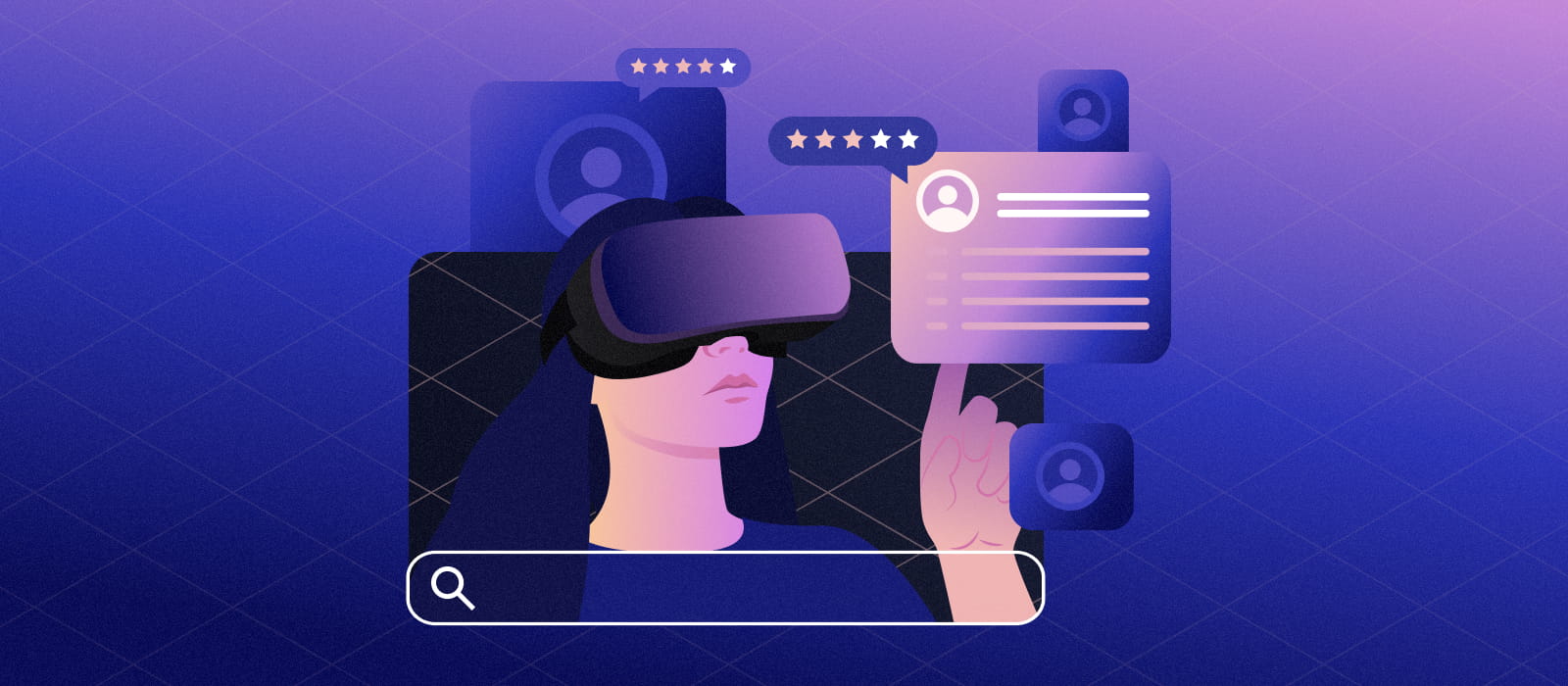Wave goodbye to traditional recruiting processes and say hello to a new era of human resources. As we journey into the metaverse, digital HR processes are transforming, inviting us to explore the dynamic fusion of virtual technology and talent.
These days, many employees are opting for either full-time remote positions or hybrid models involving only a few days in the office. The State of Remote Work Report by Owl Labs states that the percentage of employees choosing remote work in the US during 2022 has risen by 24% compared to 2021, and those favoring hybrid work have increased by 16%.
The metaverse could further expedite this trend by providing an immersive digital workspace that offers the benefits of remote work without the limitations of physical presence. Let’s explore exactly what the metaverse can offer when it comes to HR processes.
What is HR digitalization?
HR digitalization is the process of transforming traditional HR management practices into digital and technology-driven approaches.
To enable digital transformation, the HR industry relies on technologies such as cloud-based HRIS for efficient employee data management, AI apps for predictive analytics and talent management, and automation for routine tasks like payroll processing and recruitment.
The metaverse is also among the progressive tools used in the HR realm. It offers immersive avenues for virtual recruitment events, interactive onboarding processes, and creative team-building exercises.
Why is HR digitalization important? Main industry challenges
![]()
The significance of HR digitalization lies in its ability to empower HR professionals in addressing numerous challenges. These include complex data management, talent acquisition and retention, employee engagement and experience, seamless adaptation to compliance and regulatory changes, as well as the strategic alignment of HR functions with business goals.
Data management complexity
Traditional HR processes involve extensive paper-based documentation and manual data entry, leading to errors, inefficiencies, and difficulties in accessing and analyzing information.
Meanwhile, digital HR solutions offer centralized and automated data management, ensuring accurate records, easy information retrieval, and comprehensive insights for informed decision-making.
Talent acquisition and retention
Identifying, attracting, and retaining top talents can be time-consuming and competitive in today’s job market. Luckily, digital platforms enable advanced and efficient recruitment techniques, such as AI-driven candidate screening, virtual job fairs, and personalized onboarding experiences, enhancing the chances of securing and retaining skilled employees.
Employee engagement and experience
Traditional methods often struggle to keep employees engaged, informed, and motivated, leading to decreased productivity and higher turnover rates.
With digital tools, it is now possible to facilitate real-time communication, remote collaboration, and personalized learning opportunities, leading to improved employee satisfaction, engagement, and overall experience.
Compliance and regulatory changes
Navigating complex labor laws, regulations, and compliance requirements can lead to legal risks and operational disruptions if not managed effectively. Digital HR systems can automate compliance tracking, ensure accurate reporting, and provide alerts for policy updates, minimizing legal risks and ensuring adherence to regulations.
Strategic HR alignment
Digitalization frees up HR professionals from repetitive tasks, allowing them to focus on strategic activities like talent development, succession planning, and organizational restructuring, thereby aligning HR practices with broader business objectives.
HR + metaverse technologies: how do they combine?
![]()
The combination of HR and the metaverse represents a cutting-edge integration of technology and human resource practices, bringing virtual and augmented reality experiences into various HR processes.
Here are some key technologies that HR professionals can consider using:
- Virtual reality (VR). Given the immersive sense of presence and realism offered by VR and the metaverse, HR professionals can leverage this technology for virtual recruitment events, onboarding simulations, training programs, and team-building exercises, enhancing the experiential aspects of these activities.
- Augmented reality (AR). HR can employ AR for interactive onboarding tours, providing real-time information during job tasks and offering guided assistance in physical workspaces.
- 360-degree video. Human resources can use this technology to provide virtual office tours, showcase company culture, and create interactive training videos.
- Blockchain. Blockchain technology developments can be used for secure verification of credentials within the metaverse. This ensures that the information is authentic and tamper-proof, enhancing trust in virtual interactions.
- AI and natural language processing (NLP). AI and NLP can enhance virtual interactions by providing chatbots that answer questions, assist with onboarding, and facilitate employee support within the metaverse.
- Real-time collaboration tools. HR can use these tools for virtual meetings, brainstorming sessions, and collaborative projects, as they enable simultaneous interactions and updates in shared virtual spaces.
The combo of these cutting-edge technologies collectively enables HR professionals to create engaging, efficient, and impactful experiences within the metaverse, enhancing various HR functions and interactions.
Check out our VR/AR app development services to see how this cutting-edge tech can transform your business
Key benefits of implementing digital HR in the metaverse
By leveraging HR digital transformation in the metaverse, industry professionals and businesses can achieve a better employee experience and engagement, higher efficiency and resource allocation, and improved talent management.
Let’s take a closer look at each of these benefits.
Better employee experience and engagement
The metaverse transforms the employee experience by offering a dynamic platform that seamlessly integrates immersive learning and development opportunities. Through interactive simulations and virtual workshops, employees can engage in hands-on experiences that cultivate new skills and knowledge in engaging ways.
Furthermore, the metaverse empowers remote work and collaboration by providing virtual workspaces that transcend physical limitations, enabling teams to collaborate as if they were in the same room. This virtual coexistence fosters a sense of interconnectivity among teams spread across different locations.
Higher efficiency and resource allocation
The integration of metaverse developments into HR practices brings about a significant enhancement in efficiency and productivity. This is achieved thanks to the combination of automation, AI-driven scheduling, and real-time communication tools.
These technological advancements enable HR professionals to offload routine administrative tasks to virtual assistants and manage complex timetables and appointments seamlessly, minimizing scheduling conflicts and optimizing resource allocation.
Additionally, the metaverse’s real-time communication tools allow for immediate and efficient interaction between HR and employees, ensuring fast issue resolution and improved collaboration.
Improved talent management
The metaverse enables the creation of personalized career pathways for employees. This involves offering tailored learning modules, development plans, and growth opportunities based on individual strengths and aspirations. When employers actively invest in their employees’ professional growth, it makes workers feel more valued and motivated, leading to increased job satisfaction and a stronger commitment to the organization’s long-term goals.
Moreover, immersive recruitment experiences within the metaverse revolutionize talent acquisition and onboarding. Prospective employees can engage with the organization’s culture and values through virtual company tours and interactive presentations. This not only attracts candidates who align with the organization’s ethos but also provides a realistic preview of the work environment, reducing the likelihood of mismatched expectations.
Explore the top 8 metaverse business opportunities that you shouldn’t miss in 2023 and beyond
5 ways the metaverse can transform the HR industry
![]()
From enhancing talent acquisition and holding virtual career fairs to creating personalized employee development plans, the metaverse offers a range of possibilities that could completely reshape digital HR practices. Let’s dive into them right away.
Immersive onboarding and training
The metaverse can revolutionize onboarding and training processes by offering immersive simulations and interactive modules.
New employees can navigate virtual office spaces, interact with digital avatars representing colleagues, and receive hands-on training in a virtual environment. This facilitates a better understanding of their roles and ensures consistent and engaging onboarding experiences. Plus, it can be simply fun.
Virtual career fairs and recruitment
In the metaverse, HR managers can host virtual career fairs where job seekers can interact with company representatives, explore virtual booths, and engage in real-time conversations. This innovative approach to recruitment enables organizations to showcase their culture and opportunities on a global scale, attracting top talents from diverse backgrounds and different corners of the globe.
Digitized work environment
The metaverse extends the concept of remote work by creating dynamic digital workspaces. Collaborative tools, interactive dashboards, and virtual meeting spaces enable teams to seamlessly collaborate and work together on projects, regardless of geographical locations. This fosters a sense of connection and belonging among team members while significantly enhancing their productivity.
Personalized employee development plans
Through the metaverse, HR professionals can create personalized career development plans for employees based on their skills, goals, and performance metrics.
VR learning environments offer tailored courses, workshops, and mentoring experiences that empower employees to acquire new skills and grow professionally. This, in its turn, can enhance employees’ job satisfaction and boost their loyalty.
Self-service for employees
HR teams can use the metaverse to provide employees with self-service portals where they can access company information, complete administrative tasks, and seek support through virtual assistants. This alleviates the administrative burden on HR while providing employees with greater autonomy and convenience.
Companies that have embraced digital HR through metaverse technologies
At the forefront of the transformative metaverse-powered HR movement are some of the world’s most renowned brands and organizations. These pioneers are already breaking new ground by implementing VR training programs, immersive collaboration environments, and virtual job fairs.
Let’s delve into these remarkable examples.
Bank of America
Bank of America has become the first in its industry to introduce a VR training program across its 4,300 financial centers. This innovative approach has allowed around 50,000 employees to engage in practice scenarios, enabling them to refine client relationships, navigate challenging conversations, and hone empathetic communication.
The technology’s real-time analytics feature helped managers pinpoint skill gaps and offered tailored coaching, ultimately enhancing performance.
Impressively, a pilot initiative involving 400 employees resulted in a 97% increase in participants’ comfort levels when executing their responsibilities post-simulation.
Take a look at our advanced solutions for the financial industry that are bound to streamline processes and improve performance
Hyundai
In 2021, Hyundai MOBIS reimagined its new employee training by incorporating a metaverse experience through the South Korean chat app, ZEPETO.
Traditionally, the company organized group training and summer camps on Jeju Island. However, to adapt to the remote working reality, they pivoted their training methods. This metaverse experience enabled new recruits to bond virtually, creating avatars that reflected their personalities. Additionally, completing the group snapshot mission fostered closer connections among colleagues, making it a great team-building event.
Hyundai MOBIS is now exploring metaverse platforms to offer their newly hired employees virtual tours of key company facilities like workspaces, research labs, and driving test centers.
SK Telecom
In 2021, SK Telecom Co., South Korea’s leading wireless carrier, launched one-on-one interview sessions on a metaverse platform to hire new talent.
The company accepted applications from university graduates and those with less than three years of work experience. Out of these, 600 pre-registered applicants accessed SK Telecom’s metaverse platform, ifland, for one-on-one interviews. The job seekers had the opportunity to customize their avatars and engaged in open discussions with HR representatives and staff.
Moreover, other South Korean industry leaders, such as Samsung Electronics and LG Electronics, decided to join the trend too and hosted several job fairs in the metaverse.
We consulted our client on the development of the next-gen metaverse platform called UFORIKA. Learn more
Final thoughts
The metaverse is changing how businesses operate, much like the internet did many years ago. Embracing it can redefine HR practices, ensuring more efficient training and seamless, unrestricted collaboration.
However, moving into the metaverse isn’t just about technology; it’s about blending tech with the human side of businesses.
PixelPlex’s metaverse development services bridge this gap. We offer easy-to-use solutions for businesses to integrate the metaverse, guaranteeing that the human touch isn’t lost but rather amplified. We recognized the immense potential of the metaverse early on and dove right in. Today, as experts, we craft bespoke virtual spaces for your requirements, provide immersive training, and establish collaborative team zones within the metaverse.
Reach out to us to make the metaverse part of your exciting business journey.




